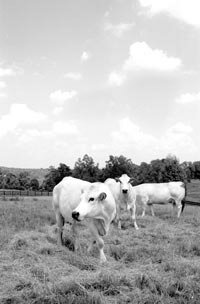NEWS- Love kills: Dairy farm tragedy raises awareness

A common farming practice, clearing out cow manure pits, turned tragic in Rockingham County.
FILE PHOTO BY JEN FARIELLO
In the aftermath of a farm accident in Rockingham County that claimed the lives of four members of a Mennonite family and a coworker, local sheriff Don Farley had the unenviable task of fielding questions from the media. How could this happen? Why did it happen?
Now that the case is officially closed, it appears the magnitude of the tragedy has hit him.
"This is such a sad case," he says, "the saddest of all the sad cases I've seen in 25 years on the job."
On July 2, farmer Scott Showalter, 34, climbed down into a manure pit below a livestock building to remove a clog in his manure pump, something he had done countless times. But this time, he was quickly overcome by a lethal combination of gases emanating from the pit. His wife, Phyllis, 33, attempted to rescue her husband but was also overcome. Two of the Showalters' four daughters, Shayla, 11, and Christina, 9, then climbed down into the pit to rescue their mother, but they were also overcome. Hired hand Amous Stoltzfus, 24, also attempted a rescue, but the gases were too powerful.
"You know that expression, 'love kills,'" says Farley. "Well, that's definitely true here."
In fact, according to studies by the National Institute for Occupational Safety and Health (NIOSH), "love" has played a part in other manure pit accidents. Of 20 such accidents the organization documented in the 1980s, 40 percent of the victims were coworkers or relatives attempting a rescue. In 1989, a 65-year-old dairy farmer, his two sons, a nephew, and a grandson all perished attempting to rescue each other from a manure pit.
"It's something farmers do all the time," said Farley, who grew up on a dairy farm. Cleaning out manure pits is "just something you don't think about."
Manure from the livestock buildings is drained into a small pit over the course of the month. At the end of each month, that manure is pumped from the smaller pit to a larger pit where it's stored before being spread on the fields.
According to Jon Ignosh, an agriculture educator with the Virginia Cooperative Extension, such accidents are rare but not unprecedented. In fact, the VCE has had a fact sheet on manure pit dangers available for farmers for several years, and Ignosh says there's plenty of information about it on the web.
While a majority of news reports cited methane asphyxiation as the cause of death in the Rockingham tragedy, Farley can't say which gases were the culprit. Because it was ruled an accident, there will be no autopsies, he says.
However, Ignosh says many of the deadly gases produced by manure could have been to blame.
"Methane, hydrogen sulfide, and carbon dioxide– any of these can kill you," he says, tacking ammonia to the list that manure can produce. "Hydrogen sulfide is a pretty nasty gas, almost like a nerve gas. In low concentrations it smells like rotten eggs, but it's odorless in higher concentrations. In addition, high concentrations of carbon dioxide and methane can take the oxygen out of the air."
Ignosh says it's an issue of complacency: farmers are around manure so much that they don't think about the dangers. To raise awareness, Ignosh says the Extension is launching an information campaign and holding two field days this summer.
According to NIOSH recommendations on manure pit safety, proper ventilation is key, as is wearing a harness with a lifeline attached to a mechanical winch, hoist, or pulley when entering the pit, and always having a person nearby to operate such equipment. The agency also recommends that an oxygen mask, like the ones used by rescue workers and firefighters, be on hand for anyone attempting a pit rescue.
"We want to take advantage of this being fresh in everybody's mind," says Ignosh, who adds that the field days will present the science of the danger, prevention measures, and review the best ways to respond to a manure pit accident.
"We also want to target children," he says, "and make sure they're aware of the dangers."
Of course, love also heals. According to Farley, friends rushed in to take responsibility for running the farm– even milking the cows the morning after the tragedy.
Family and church members have taken responsibility for caring for the Showalters' two remaining daughters, Brooklyn Joy and Alyssa Nicole, ages 7 and 3. Scott Showalter is also survived by three brothers, a sister, his parents, and two sets of grandparents. At press time, calls to church and family members were unreturned, but Farley says he's not surprised.
"It's hard to reach members of that denomination," he says of Mennonites. "They tend to shy away from law enforcement and the media."
#